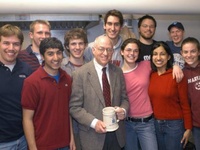
Baker Professor of Economics Martin S. Feldstein ’61 answers student-submitted questions during his last Ec10 lecture.
Baker Professor of Economics Martin S. Feldstein ’61 may have left the federal government more than two decades ago, but keeping one foot in the door, he continues to exert powerful influence on national economic policy.
His proteges have risen to the nation’s top economic policy posts, and Feldstein himself has counseled the Bush administration from behind the scenes.
And now, after his 21-year break from government, some predict a return to the nation’s capital may be in store for the 65-year-old economist. Experts say Feldstein—an economic superstar who has gained international respect for his bedrock ideas in academia and policy—is one of three top candidates for the chairmanship of the Federal Reserve.
He began his career as an economist at Harvard nearly 50 years ago, but unlike other contenders for the post, Feldstein hasn’t held a job in Washington since 1984, when he finished a term as chairman of President Reagan’s Council of Economic Advisers (CEA). At the CEA, Feldstein gained a reputation as a conservative economist with a strong dislike for deficits.
During his tenure, he broke party ranks and advocated temporary tax hikes to reduce the deficit, a move that drew ire from Republicans and later prompted Reagan to hint that he might abolish the CEA.
But despite his rocky tenure in government, Feldstein maintains a close relationship with policy-makers in Washington to this day and remains a fervent supporter of President Bush’s economic policies.
In Cambridge, Feldstein runs the nation’s leading economic research center—the National Bureau of Economic Research (NBER)—which, among other things, decides when recessions officially begin and end.
Colleagues say leaders turn to “Marty” for his unparalleled acumen and straightforward advice.
“He’s just a good, very natural economist, someone who is able to think through any economic problem and come up with the right answer pretty quickly,” says Professor of Economics Caroline M. Hoxby ’88.
Feldstein’s peers say that he works like a human catalyst, providing the passion and vigor necessary to communicate his ideas and get them into practice.
“He has more energy than anyone else on the planet,” says Jeffrey B. Liebman, an associate professor of public policy at the Kennedy School of Government (KSG).
Feldstein’s experience in academia and his relationship with current administration officials have led many to speculate that when the seat of the Fed chair is vacant next January, President Bush will turn to Martin Feldstein to head the nation’s central bank.
HARVARD MAN
Born in 1939, during the final years of the Great Depression and at the onset of World War II, Feldstein grew up in the suburbs of New York City. He left for Harvard at age 17 and graduated four years later as both an economics concentrator and a pre-med.
Feldstein was torn between his interests in economics and medicine throughout his undergraduate career. After college, he was accepted to Harvard Medical School, but decided to postpone his enrollment after he received a full-ride scholarship to attend Oxford University.
Read more in News
Sigma Chi Frat Still Homeless After Failed Bid













